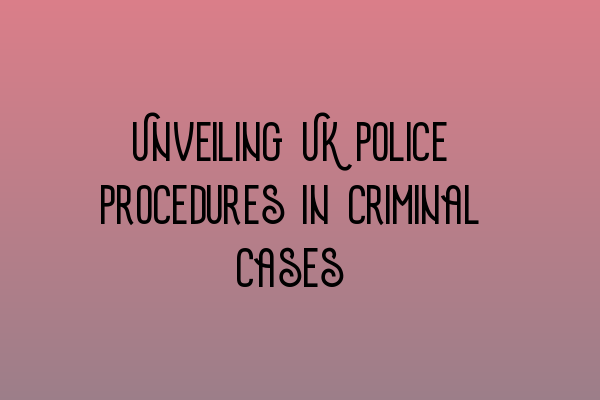Unveiling UK Police Procedures in Criminal Cases
When it comes to criminal cases in the UK, understanding the police procedures is essential. Police play a crucial role in gathering evidence, interviewing suspects, and ultimately building a case against individuals accused of committing a crime. In this article, we will delve into the intricate details of UK police procedures in criminal cases, providing you with insights that can greatly benefit your understanding of the legal system.
Evidence Collection and Preservation
In any criminal investigation, evidence collection and preservation is of utmost importance. The police are responsible for identifying, gathering, and preserving evidence that can help prove or disprove a crime. This can include physical evidence, such as weapons or DNA samples, as well as digital evidence, such as CCTV footage or electronic communications.
To ensure that evidence is admissible in court, the police must follow strict protocols during the collection process. These protocols aim to maintain the integrity and chain of custody of the evidence, ensuring that it has not been tampered with or contaminated. By adhering to these procedures, the police ensure that the evidence will be considered credible and reliable during the trial.
Arrest and Detention
When the police have grounds to believe that an individual has committed a crime, they have the power to arrest and detain that person. The arrest process involves informing the suspect of the reasons for the arrest, their rights, and any charges against them. The police must also ensure that the arrest is lawful and conducted with the necessary authority.
Following the arrest, the suspect can be detained for questioning and further investigation. The police must inform the suspect of their right to legal representation and access to a solicitor. This right ensures that the suspect has the opportunity to seek legal advice during the interrogation process, protecting their legal rights and ensuring a fair trial.
Interviewing and Interrogating Suspects
During the investigation, the police will interview and interrogate suspects to gather information and elicit statements. These interviews may take place at the police station, and the suspect has the right to have a solicitor present during the questioning. This legal representation ensures that the suspect understands their rights and can seek advice on how to respond to questions.
It is important to note that the police must conduct the interviews in a fair and non-coercive manner. Any evidence obtained through improper methods, such as coercion or violation of the suspect’s rights, may be deemed inadmissible in court. Therefore, it is crucial for the police to follow proper procedures and respect the rights of the suspects throughout the interview process.
Conclusion
Understanding UK police procedures in criminal cases is vital for anyone involved in the legal field. By familiarizing yourself with the evidence collection process, arrest and detention protocols, and interviewing procedures, you can better comprehend the role of the police in criminal investigations.
For further knowledge and expertise, we recommend exploring our related articles:
- Workshops and Seminars on Criminal Practice: Expanding Your Expertise
- Updates in UK Criminal Laws: Staying Informed and Prepared
- Enhancing Your SQE Criminal Law Study Group Experience
- Decoding Criminal Evidence Rules: A Detailed Analysis
- Deep Dive into Fraud and Financial Crimes in the UK
By expanding your knowledge through these articles, you can further enhance your understanding of criminal law and practice in the UK.
